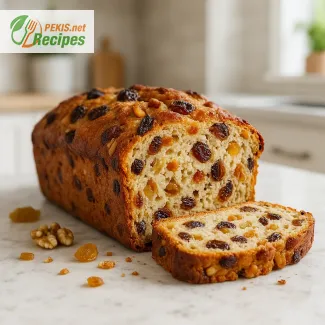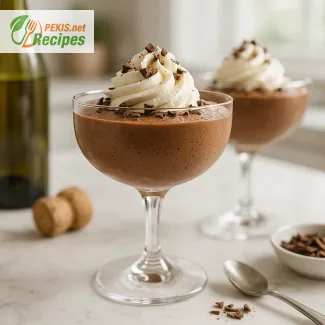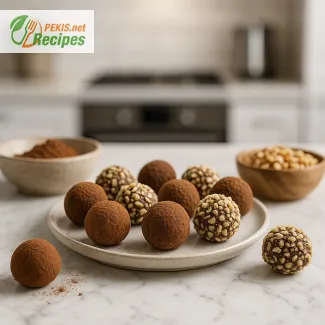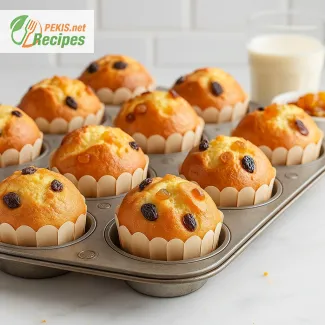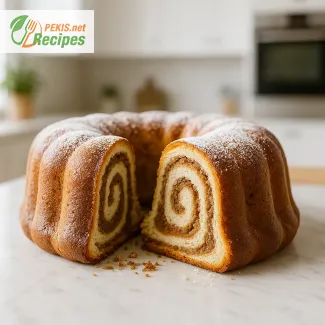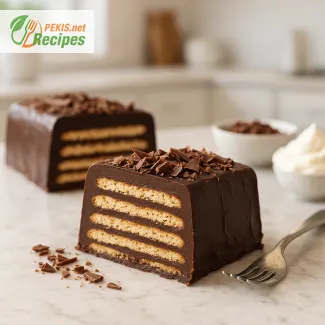Serves 4 portions, ready in about 60 minutes total with 25 minutes prep and 35 minutes cooking. Honey-glazed duck breast with cranberry orange sauce combines tender, crisp-skinned duck, sweet honey glaze, and a bright citrus-berry reduction for a perfectly balanced festive main course. The sauce can be made ahead and reheated, while the duck is best seared just before serving to preserve its golden, caramelized texture. Ideal for holiday dinners, the dish offers a refined harmony of sweet, tangy, and savory flavors that pair beautifully with potato gratin or roasted vegetables.
Creating this honey-glazed duck breast with cranberry orange sauce has always felt like a small celebration in itself — the moment when the glaze turns golden, and the citrus scent fills the kitchen. It’s one of those recipes that balances precision and intuition, where patience during searing rewards you with crisp perfection and deep flavor. The sauce, rich with fresh cranberries and orange zest, carries that comforting warmth of winter dinners shared with friends or family.
PEKIS – professional chef and recipe developer with over 25 years of experience in cooking and baking, specialized in European and international cuisine.
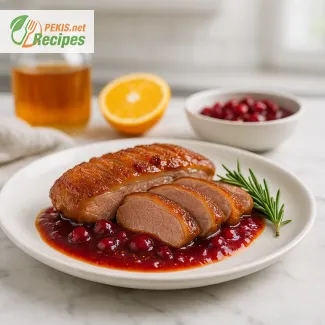
Golden roast duck with honey glaze and cranberry–orange fusion
A festive centerpiece rich in flavor, color, and timeless elegance
When the skin turns golden and crisp, and the scent of honey caramelizing with citrus and berries fills the air, this dish transforms the table into a celebration of warmth and sophistication. Honey-glazed duck breast with cranberry orange sauce brings together sweet, tangy, and savory notes in a perfect winter harmony — the kind of balance that defines fine festive dining. The natural fat of the duck melts gently under the glaze, leaving the meat tender and aromatic, while the sauce offers a bright contrast that cuts through richness with its citrus-berry sharpness.
The art of honey and citrus balance
Duck and fruit have been companions for centuries — from French canard à l’orange to traditional British roast duck with apple compote. This version blends modern lightness with classic flavor: golden seared duck skin brushed with fragrant honey, a sauce of fresh cranberries and sweet oranges, and a touch of spice that enhances depth without overpowering the natural gamey character. Every bite delivers layers — silky fat, tender meat, and the lingering sparkle of caramelized fruit.
A brief look into origin and inspiration
The combination of duck and fruit sauces dates back to Renaissance banquets in France and Italy, where contrasting flavors were a sign of refinement. Over time, citrus replaced heavier reductions, and honey substituted the once-popular sugar syrups, bringing a natural sweetness and a glossy texture. Today, this honey-cranberry-orange pairing has become a favorite for holiday tables across Europe and North America, admired for its aromatic glaze and jewel-like color that feels both festive and timeless.
Why you’ll love this recipe
• Elegant yet approachable – restaurant-quality flavors, easy enough for a home cook.
• Perfect holiday balance – sweet, tangy, and savory in every mouthful.
• Visually stunning – glossy glaze, ruby-red sauce, and golden duck skin.
• Flexible pairing – works with root vegetables, potato gratin, or fresh greens.
• Make-ahead friendly – parts can be prepared earlier for stress-free entertaining.
Key flavor elements and how they work together
- Duck breast: naturally rich, it carries the flavors of honey and fruit beautifully.
- Honey: creates the signature glossy glaze and a subtle floral sweetness.
- Cranberries: their acidity lifts the richness, providing a bright contrast.
- Orange zest and juice: add warmth, aroma, and depth to the sauce.
- Fresh herbs (rosemary or thyme): balance the sweetness and tie flavors together.
Serving inspiration and festive pairings
Serve the duck sliced diagonally over a mirror of sauce, with a side of roasted carrots, buttery greens, or creamy potato gratin. The caramelized glaze pairs beautifully with dry red wines like Pinot Noir or Côtes du Rhône. A touch of sea salt flakes just before serving sharpens the sweet-savory interplay.
More festive recipes to explore
If you enjoy this honey-glazed duck, explore other warm and elegant recipes for your holiday menu:
• The best potato gratin – creamy, golden, and comforting alongside roast meats.
• Spiced Pear and Almond Crumble Tart – a Warm Autumn Dessert – the perfect sweet finale with the same warm seasonal tones.
Storing and preparing ahead
Duck breast can be marinated a day in advance with honey, citrus zest, and spices, allowing flavors to infuse deeply. The cranberry orange sauce keeps well in the refrigerator for up to three days and can be reheated gently before serving. To retain the crisp skin, sear the duck right before plating and spoon the warmed glaze over it at the last moment.
Flavor entities and culinary context
This dish connects key culinary elements:
• Ingredient group – duck breast, citrus, berries, honey.
• Culinary context – festive winter cuisine, fine dining, French-inspired roast.
• Techniques – searing, glazing, deglazing, sauce reduction.
• Seasonal relevance – late autumn to early spring menus.
Creative variations
• Add a splash of Grand Marnier or port wine to the sauce for deeper aroma.
• Replace cranberries with pomegranate or red currants for a brighter note.
• Try wildflower honey or chestnut honey for a stronger caramelized depth.
• Serve with a side of herbed mashed potatoes or a roasted beet salad for color and balance.
• For a lighter version, glaze duck legs confit and finish under the grill for a crisp touch.
Sensory impression and dining experience
From the shimmering glaze to the aromatic citrus steam rising off the plate, every element of this dish feels celebratory. It embodies the warmth of winter gatherings — a harmony of sweetness, spice, and savory depth that invites conversation and comfort around the table.
- Score and season the duck breasts.
Pat the duck skin dry and make shallow diagonal cuts about 1 cm (0.4 inch) apart. Season both sides with salt and black pepper. - Render and crisp the skin.
Place duck breasts skin side down in a cold pan. Turn the heat to medium and cook 8–10 minutes until the skin turns golden and crisp, and most of the fat has rendered. Remove excess fat if necessary. - Finish cooking the duck.
Turn the breasts and cook for another 5–6 minutes for medium doneness. Adjust time depending on preferred texture. Remove from the pan and let rest 5 minutes before slicing. - Prepare the cranberry–orange sauce.
In a small saucepan, combine fresh cranberries, orange juice, orange zest, brown sugar, and balsamic vinegar. Simmer for about 10 minutes until the berries burst and the sauce thickens slightly. - Add honey and butter.
Stir in honey and butter for shine and balance. Dissolve cornstarch in water and add gradually for a smooth, glossy consistency. - Combine and glaze.
Return the duck to the pan, brush with warm glaze, and heat briefly for 1–2 minutes over low heat to coat evenly. - Serve.
Slice the duck diagonally, arrange on plates, and drizzle with cranberry–orange sauce. Decorate with fresh rosemary sprigs.
FAQ questionHow do I keep the duck breast skin crispy?
To keep the skin crispy and golden, start the duck in a cold pan skin-side down and let the fat render slowly over medium heat. This melts the fat layer under the skin and prevents it from steaming. Don’t cover the pan, and don’t move the duck too soon — let the skin brown undisturbed for 8–10 minutes. After cooking, let the duck rest on a rack (not directly on a plate) so the skin stays dry and crisp.
FAQ questionCan I make the cranberry orange sauce ahead of time?
Yes. This sauce is perfect for make-ahead cooking. Cook the cranberries with orange juice, zest, honey, and vinegar until glossy and thick, then cool and store in an airtight container in the fridge for up to 3 days. Reheat gently over low heat and, if it becomes too thick, loosen with a spoon of water or orange juice. Glaze the duck only right before serving so it stays shiny.
FAQ questionWhat can I serve with honey-glazed duck breast?
This dish pairs best with sides that balance its sweet–tangy and rich character. Serve it with creamy potato gratin, roasted root vegetables, sautéed green beans, or a warm winter salad with nuts and citrus. Starchy sides help absorb the sauce, while slightly bitter greens add fresh contrast.
FAQ questionCan I use frozen cranberries instead of fresh?
Absolutely. Frozen cranberries work just as well and are often more consistent in flavor. Add them straight to the saucepan (no thawing needed) and cook until they burst. You may need to cook 1–2 minutes longer to reduce extra moisture. Taste and adjust sweetness with a little more honey if the berries are very tart.
FAQ questionHow do I know when duck breast is cooked?
Duck breast is best when it’s still slightly pink inside. After searing skin-side down and flipping, cook for 5–6 minutes for medium doneness. You can check with a thermometer: 58–60°C (136–140°F) gives you juicy, tender meat. Let it rest for 5 minutes — the juices will redistribute and the temperature will rise slightly.
FAQ questionCan I make this recipe dairy-free or gluten-free?
Yes. The recipe is naturally gluten-free as long as your balsamic vinegar is certified gluten-free. To make it dairy-free, swap the butter in the sauce for olive oil or plant-based butter. All other ingredients — duck, honey, cranberries, orange — stay the same, and the flavor profile remains festive, bright, and balanced.
The honey-glazed duck breast with cranberry orange sauce brings together everything that defines refined festive cooking — depth, color, aroma, and balance. Each bite offers the tender richness of duck, the sweet caramel glaze, and a bright fruit acidity that awakens the palate. It’s a dish that feels celebratory yet grounded in simple, honest flavors, built on precision and natural pairing.
Every element in the recipe has purpose: honey for gloss and warmth, cranberries for their tart freshness, and orange zest for the delicate citrus lift that completes the sauce. The contrast between the crispy skin and the velvety sauce creates a layered texture that makes this dish memorable. It embodies how a few well-chosen ingredients can transform into something elegant and full of character.
As it rests on the plate, the golden duck catches the light, the sauce glows ruby red, and the aroma of herbs and caramelized citrus fills the air. It’s more than a festive centerpiece — it’s an experience that lingers through scent, taste, and texture. The moment you slice through that crisp skin, the balance of flavors reveals itself: sweet, savory, and aromatic, perfectly in tune.
The result is timeless: a dish suited for winter celebrations, romantic dinners, or any evening when flavor deserves to take center stage. It proves that comfort and sophistication can exist on the same plate — a reminder that culinary artistry lies not in complexity, but in balance, patience, and detail.
- None of the main EU allergens (no gluten, nuts, dairy, or soy).
- Possible trace of lactose if using butter — replace with plant-based butter for a dairy-free version.
- Gluten-free – all ingredients are naturally gluten-free.
Allergen-free substitutions
- Replace butter with olive oil or vegan butter for lactose intolerance.
- Ensure balsamic vinegar is certified gluten-free.
- Vitamin C: 22 mg – supports immune system and antioxidant defense.
- Vitamin B6: 0.6 mg – contributes to metabolism and energy release.
- Vitamin B12: 1.5 µg – essential for red blood cell formation.
- Iron: 3.2 mg – supports oxygen transport in blood.
- Zinc: 2.4 mg – strengthens immune function.
- Potassium: 420 mg – helps regulate blood pressure.
- Magnesium: 28 mg – supports muscle and nerve function.
- Anthocyanins (from cranberries): 45 mg – protect cells from oxidative stress.
- Flavonoids: 30 mg – support cardiovascular health.
- Beta-carotene (from orange zest): 0.2 mg – aids in maintaining healthy skin.
- Polyphenols (from balsamic vinegar): 20 mg – provide anti-inflammatory benefits.
- Vitamin E: 2 mg – neutralizes free radicals and protects cell membranes.
